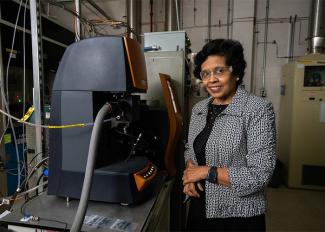As one of NETL’s most prolific researchers, Ranjani Siriwardane is listed as co-inventor of 25 U.S. patents and has earned numerous scientific awards for discoveries that have had a profound impact on the production of clean and affordable electricity.
None of those accomplishments, however, would have been possible without the support of family members, teachers and others who recognized Siriwardane’s early interest in science, technology, engineering and mathematics (STEM), and encouraged her to pursue her dreams and overcome obstacles she faced growing up in Sri Lanka, an island nation in South Asia.
“Women were encouraged to take STEM classes, but mainly in the biological sciences only. Far less emphasis was given to placing women in educational programs for mathematically oriented physical sciences. One of the biggest issues in Sri Lanka at that time was the limited availability of universities for higher education. For those reasons, many girls who excelled in science and math could not enroll in STEM studies,” said Siriwardane, a senior research scientist who has earned three R&D 100 Awards and was recently named as among the top 2% of scientists in the world for citation impact (how many times a scientist’s published work is cited in other articles or books) by the journal PLOS Biology.
As a girl, Siriwardane read about great women scientists such as Marie Curie, the first woman to receive the Nobel Prize. When Siriwardane demonstrated a strong interest in math in the sixth grade, her parents began encouraging those academic interests and guiding their daughter toward higher education despite societal norms deterring women from many STEM studies.
“In my mother’s generation, women were told they could not pursue higher education. My grandfather had asked my mother to stay home after eighth grade, but she convinced my grandfather to let her go to school and become a teacher. In this way, she was a pioneer, and I followed her example,” said Siriwardane, who went on to earn her doctorate in physical chemistry at Virginia Tech.
Throughout her 33-year career at NETL, Siriwardane has actively encouraged women to take STEM courses and consider STEM careers. She offers proven advice to address challenges they may face in their studies and along the career path.
“Don’t get discouraged if a class is hard. Seek out a tutor or other available help in your area, and keep in mind there are many summer programs and courses you can take,” Siriwardane said.
She encourages future researchers to take advantage of internships and summer learning experiences provided by various organizations and companies to learn how classroom skills translate into hands-on research. “This provides insights into how rewarding STEM-related jobs can be and the positive impact they have on society,” she said.
Thursday, Feb. 11, 2021, is the International Day of Women and Girls in Science, which was established by the United Nations to call attention to the need for gender equality in STEM careers and educational opportunities. Siriwardane believes it is imperative that the day is recognized.
According to United Nations data, only 30% of the world’s researchers are female. “Sadly, in certain places, STEM education for girls is discouraged due to ignorance. It is a very important for us to not only recognize this day but to also provide opportunities, resources and funds for all girls to receive STEM education and pursue careers in science and math,” said Siriwardane, whose research includes the development of technologies to capture carbon dioxide generated by fossil energy power plants and store it safely underground or convert it into useful products.
At NETL, Siriwardane serves as a mentor for various NETL internship programs. She instructs her mentees to become well-rounded researchers and master written communication skills to improve the probability that their projects and findings will be published.
Siriwardane also provides free tutoring to students at West Virginia University and local high schools. “I don’t charge any money for tutoring, which means we don’t have to limit tutoring time due to costs,” Siriwardane said. “The large classroom can be daunting. That’s why it’s so important for these students to get private individual tutoring so they don’t drop out of a program because of one bad grade in a math or science class,” she added.
Click here to watch NETL’s video that explores Siriwardane’s commitment to STEM education and outreach.
The U.S. Department of Energy’s National Energy Technology Laboratory develops and commercializes advanced technologies that provide reliable and affordable solutions to America’s energy challenges. NETL’s work supports DOE’s mission to advance the national, economic and energy security of the United States.




